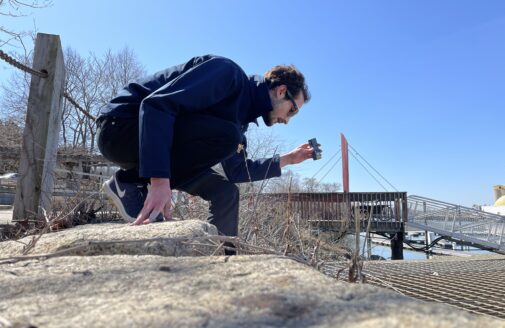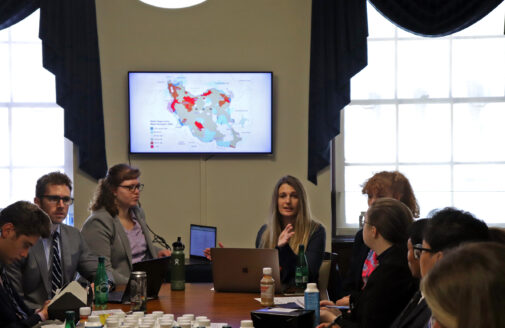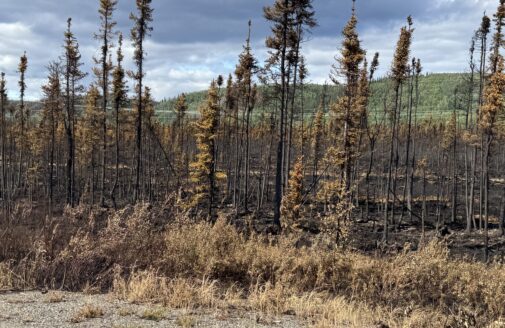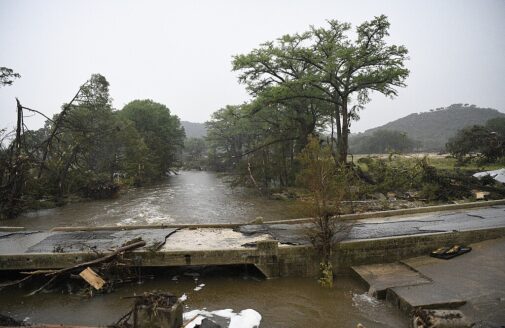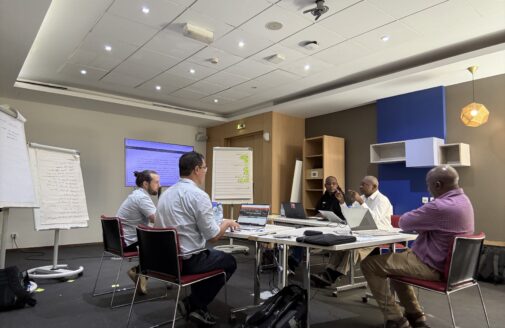Bridging the gap between science and policy
How the Government Relations team leverages Woodwell Climate’s research into policy change
Director of Government Relations, Laura Uttley, speaks outside the U.S. Capitol on Woodwell’s latest fly-in event.
photo by Eric Lee
On September 13, 2023 a group of 15 of Woodwell Climate Research Center staff, scientists, and board members gathered on Capitol Hill in Washington, DC. They had a big day ahead of them: on the docket were around 16 different meetings with Congressional staff and Members of Congress on topics ranging from carbon markets and the Farm Bill, to water research, to assessments of climate risk. The goal was clear across the board: share the takeaways from Woodwell’s scientific research with the very policymakers who are tasked with making decisions on climate issues.
This was Woodwell Climate’s second annual “Fly-In”—so called because it brings team members of a non-DC-based organization, like Woodwell, face-to-face with policymakers in Congress. The masterminds behind the Fly-In were staff members who are part of an invaluable team at the Center: the Government Relations (GR) team.

GR team members (left to right) Laura Uttley, Andrew Condia, Natalie Baillargeon, and Dave McGlinchey.
photo by Eric Lee
Building a team for the greatest impact
Woodwell Climate has always been involved in the policy-making process. From its outset, the driving principle behind the Center has been carrying out scientific research to inform decision making. For many years, however, there were no team members on staff whose primary responsibility was to bridge the gap between science and policy. When Dave McGlinchey, Chief of Government Relations, came on board with the Center via the Communications team, then-president Dr. Philip Duffy was taking on much of the policy work himself. It became clear as the Center grew that, in order to realize the full impact potential of the Center’s research, they needed a dedicated policy team.
Today, the GR team has four full-time members who come from a diverse set of professional backgrounds. McGlinchey got his start as a journalist on Capitol Hill who “fell in love with the policymaking process” and felt drawn to address the severity of the climate crisis. Laura Uttley, Director of Government Relations, has been a lobbyist in D.C. for over ten years and was excited to join a relatively new team establishing its roots in the capital. Andrew Condia, External Affairs Manager, spent many years working in the office of a U.S. Senator as a liaison for local government officials. He pivoted to Woodwell because he wanted a more narrow focus on a policy area he was passionate about: solving environmental problems. And Natalie Baillargeon, a Policy Analyst, was a scientist first before she realized that her passion lay in transforming that science into useful policy.

Natalie Baillargeon presents an overview sheet of Woodwell’s research.
photo by Eric Lee
It is precisely this diversity of perspectives that makes the team so effective, Uttley says, because they are able to reach decisions by coming at problems from many different angles. The full-time team members work alongside Dr. Peter Frumhoff, a part-time Senior Science Policy Expert, and Government Relations Assistants Saskia Braden and Abby Fennelly.
The road from research to legislation
In the three years since the creation of the team, the investment in dedicated GR staff members has proven invaluable.
“In 2023, it’s no longer enough to produce good science and hope something good comes of that…What we came to realize is that we really need to get involved in shaping that policy,” McGlinchey says. “The science is not getting put to use otherwise. And if we don’t get involved in the policymaking process, other people will, and oftentimes it will be people who are not prioritizing climate stability as one of their main objectives.”
So how does the GR team shape policy?
“Anytime the government acts, there’s an opportunity to influence policymakers, legislation, or regulations and promote or defend policies that advance Woodwell’s interests,” Uttley says. For the members of the GR team, their job is to spot those opportunities and leverage Woodwell’s science in a way that improves climate policy.

Senior scientist, Dr. Jennifer Francis testifies before congress on the connection between climate change and extreme weather.
That process starts with building relationships and trust with decision makers. As McGlinchey puts it, “you can’t show up in these policymaking settings and just expect people to welcome you in and embrace your science right off the bat.”
The GR team puts time and effort into establishing Woodwell’s reputation for producing rigorous, high-quality science and advocating for pragmatic, nonpartisan policies that foster relationships and improve climate-related legislation. After building the organization’s credibility with the government, team members take a two pronged approach to advancing climate policy. The first is to spot windows within existing legislation where “there could be a stronger role of climate science,” McGlinchey says.
One example of this is Woodwell’s work on the Farm Bill, legislation that authorizes programs related to agriculture, nutrition, conservation, and forestry policy and must be renewed every five years. Given climate science pertains to a range of topics and policies included in the Farm Bill, Woodwell developed policy priorities, hosted a congressional briefing, drafted legislative text alongside congressional offices, and spoke with decision-makers about advancing the role of climate science in the Farm Bill.
The second approach Woodwell’s GR team takes is to build support for new initiatives. An example of this is Woodwell’s push for the development of a more coordinated system of national climate services, which grew out of one of the Center’s flagship programs: Just Access.
Just Access is a partnership between GR and Woodwell’s Risk program that provides “useful, relevant, accessible, and free of charge climate information that can help communities make forward thinking policy decisions,” says Condia, who leads this work on the GR side.
GR team members find and communicate with partner governments around the world, providing project management while the Risk team completes the scientific assessment of risk for relevant climate factors such as heat, flooding, and drought.
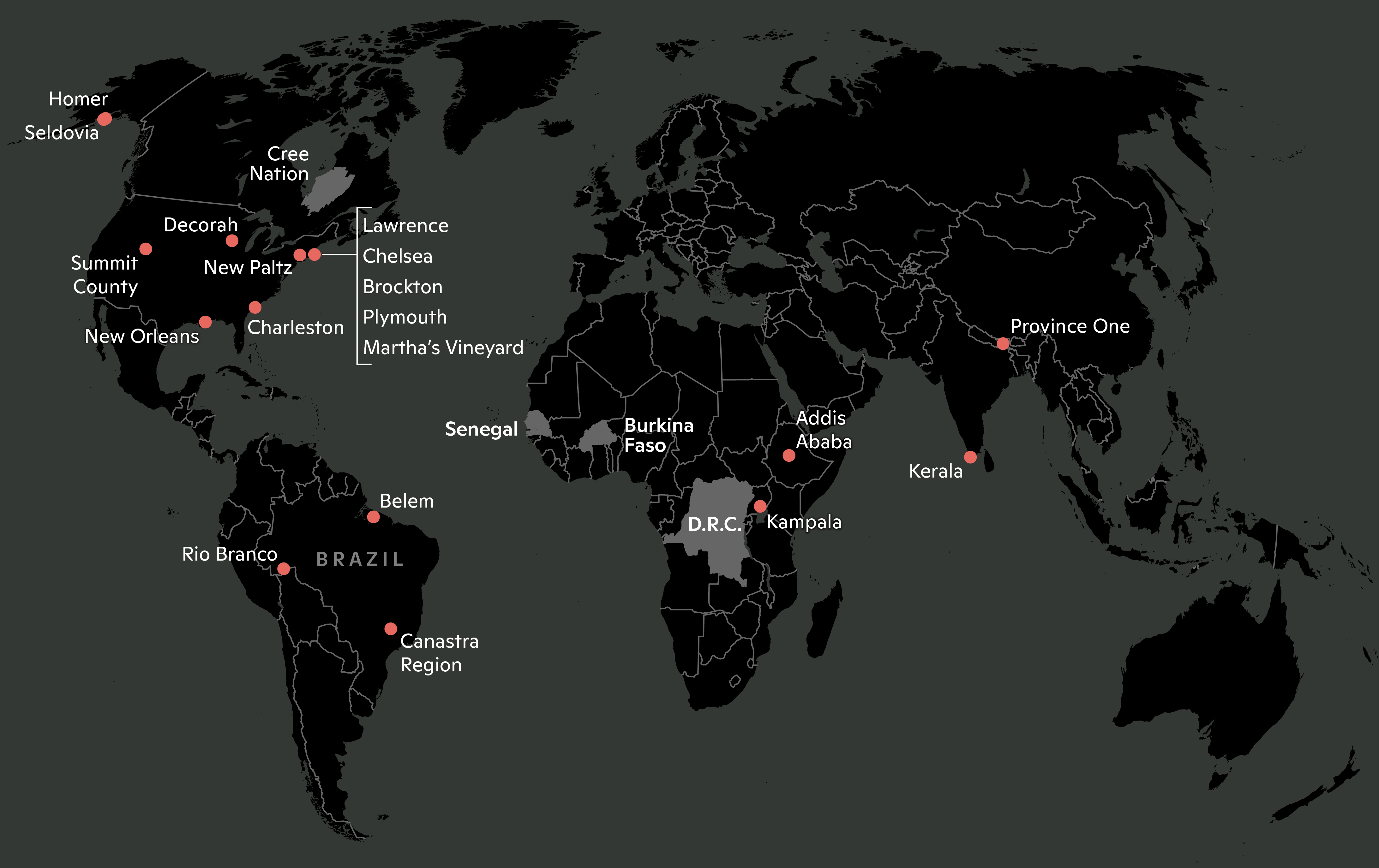
map by Christina Shintani
Through this work, the Woodwell team has come face to face with the enormous gaps in delivery of climate services and information to local and regional governments. “You realize that you’re just scratching the surface,” McGlinchey laments. “You work with Chelsea, Massachusetts, and it’s important and powerful. But there are 1,000 other communities like it that I wish we could work with.”
For many communities, Condia says, “the Just Access program may be the only opportunity they have to have access to this data, to be able to understand their climate future.” This realization led the GR team to develop an advocacy framework calling for a new federal initiative establishing comprehensive national climate services.
From Chelsea, Massachusetts to the DRC
Federal policy work can be a long game. For Baillargeon, working on more local projects like Just Access is exciting because “when we work with these communities, science is in the hands of decision-makers immediately.” In many cases, communities quickly undertake steps towards protecting vulnerable residents and infrastructure identified by the risk assessments. In Chelsea, Massachusetts, city officials integrated the results of the assessment into their planning for equitable climate resilience solutions. In Charleston, South Carolina, local governments are using their risk assessment as support for a National Oceanic and Atmospheric Administration (NOAA) grant application.
It’s not just in the United States where these risk assessments have an impact. For the Democratic Republic of Congo’s Environment Ministry, Woodwell completed a unique assessment that included an analysis of risk to forest carbon stocks. The risk assessment led to a request for Woodwell to support the creation of a regulatory agency for carbon markets.
For McGlinchey, this work is incredibly exciting. “This is a once-in-a-generation opportunity to direct enormous amounts of funding into forest conservation efforts… and we need those forests conserved if we’re going to have a stable climate.” Voluntary carbon markets, he says, have not historically been reliable. What’s happening now in the DRC is an opportunity for Woodwell policy experts to support the creation of science-backed standards to ensure that when offsets or credits are sold there is a verifiable climate benefit. In short: “there’s a lot at stake here.”
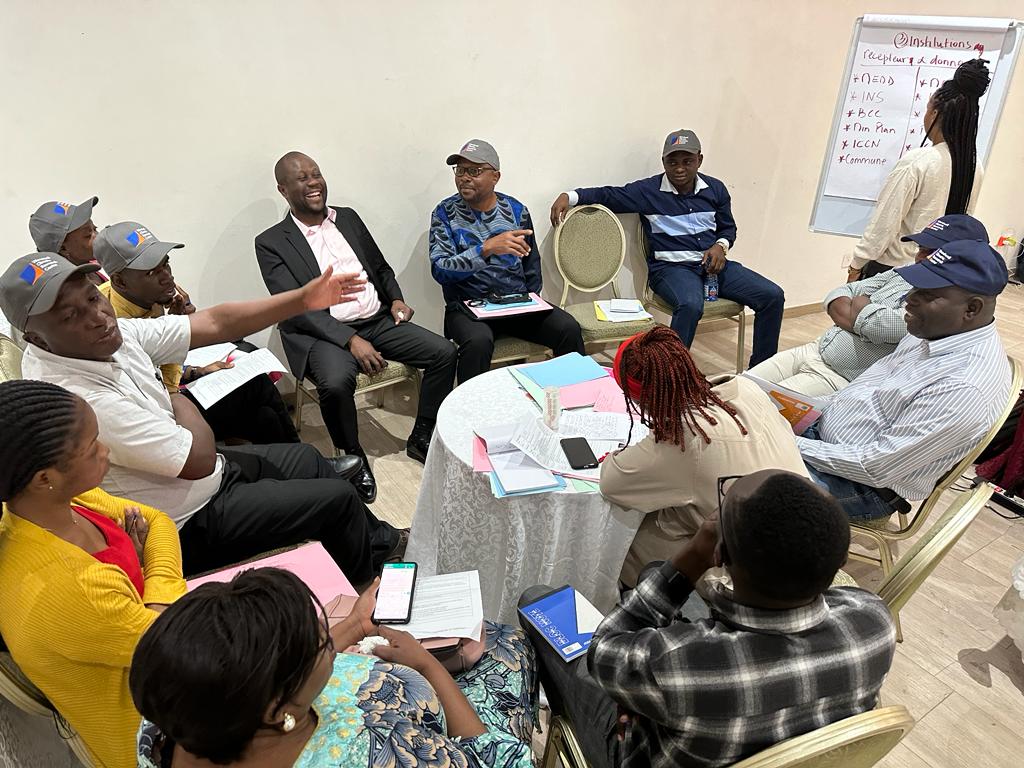
(above) Participants in recent risk and carbon markets workshop in the DRC.
(below) GR team, alongside Woodwell Scientists, walking to meetings for the fly-in event.
photo by Abby Fennelly
Endless possibility for policy action
The flow of opportunities for leveraging Woodwell’s research continues to build momentum. The team is rising to meet the challenge, and there is a lot they want to accomplish in the coming years. As they take on new projects and add new team members, they will continue to stay true to the organization’s mission, never straying from the science. Each team member was adamant about one thing: Woodwell does things differently, and it is that difference that leads to such a profound policy impact coming from such a small team.
“Woodwell exists in not a unique niche, but an unusual one,” McGlinchey says. “We’re not a pure science organization, but we’re not a straight advocacy organization. We bring deep scientific credentials and then we get into the policymaking room and engage and try to create better legislation… people appreciate it. They appreciate that our motivations are purely focused on a stable, safe climate.” It’s what makes an event like September’s Fly-In so successful. Science, translated into policy, without the political baggage.
“Once they figure that out about Woodwell,” says McGlinchey, “they want to work with us.”





